Nostalgia: Admirers recalled the former statesman with fondness at his memorial service this week.
A naughty, nostalgic smile flashes across Peter Nnane’s weathered face as he recounts how he was once arrested by the Bophuthatswana police during one of their raids on shebeens in the homeland.
Nnane caresses the carton of sorghum beer in his lean hands and shakes his head in boyish reminiscence before taking another gulp.
“I spent two nights in jail,” he says, sitting in the shade of a vine tree in a shebeen in Tlhabane location, near Rustenburg. No one in his family was prepared to pay the R50 admission of guilt fine that would get him out of the holding cells at the Tlhabane police station.
“My family felt they did not send me to the shebeen,” he laughs. “So, they just left me there for two days.”
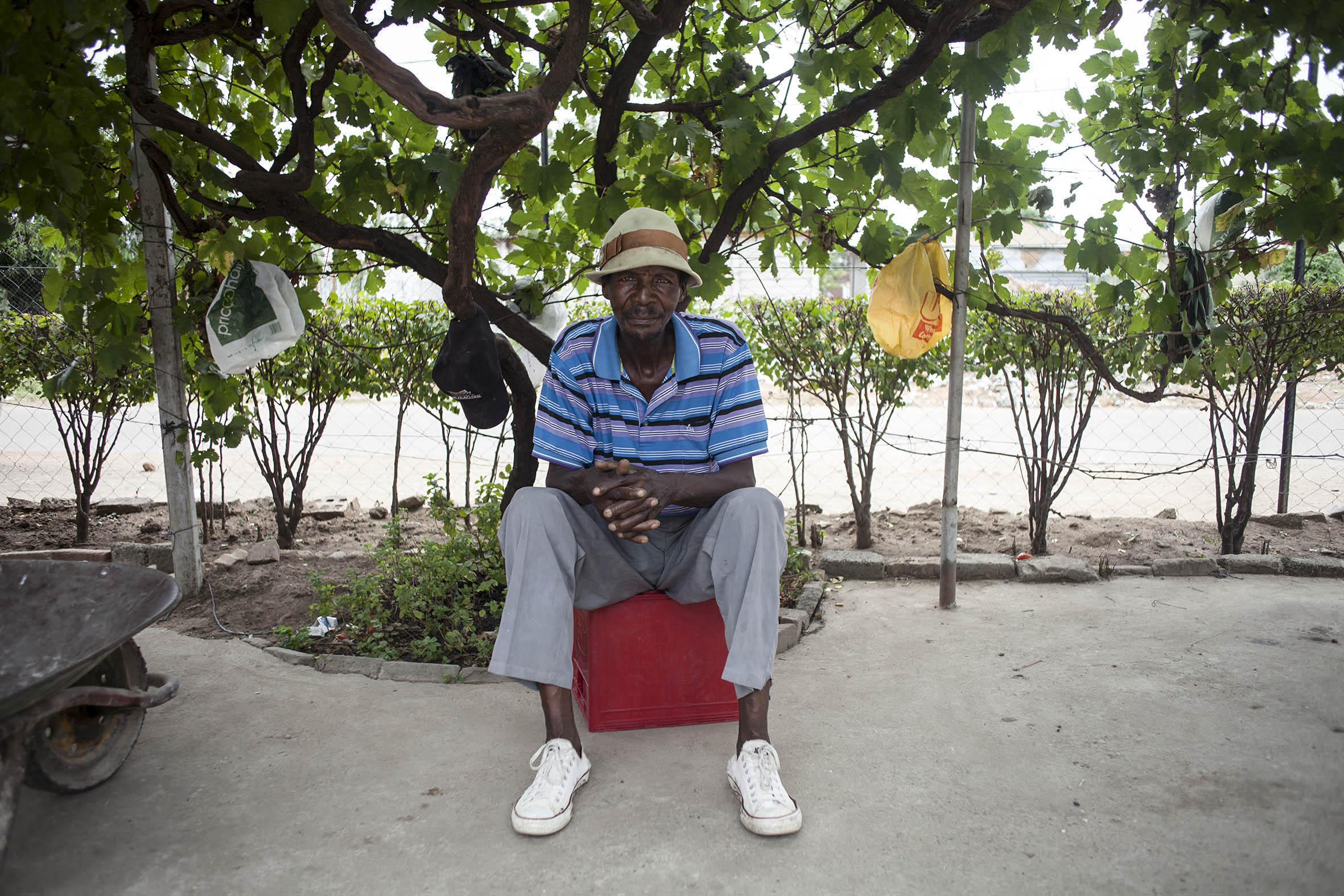
[Peter Nnane says service delivery was better under Mangope (Oupa Nkosi)]
That was life in 1980s Bophuthatswana, when an outing to have a drink often came with the risk of landing in police holding cells.
The homeland’s notorious police, spurred on by president Lucas Mangope’s dislike for booze, conducted regular raids on illegal liquor outlets, carried out with violent vigour and enthusiasm.
Such was life in Bophuthatswana, where Mangope’s administration sought to control almost every aspect of its citizens’ lives — religion, sport, recreation, business, political thought and affiliation.
On Wednesday afternoon, scores of Mangope’s admirers packed the community hall in his home village of Motswedi near Zeerust to pay their last respects to the former homeland strongman. Mangope (94) died at his village home on Thursday, January 18.
Speakers at the memorial service, attended mostly by elderly people and children from the local high school, reminisced about Mangope’s passion for education, the arts, sport and good governance. They hailed him as a pioneer who brought infrastructural development, safety, security and a sense of purpose and patriotism to the homeland.
They cited personalities serving in South Africa’s current democratic dispensation as shining examples of Mangope’s legacy and devotion to democracy. These included Chief Justice Mogoeng Mogoeng, who studied at the University of Bophuthatswana and served in the homeland’s justice system in the 1980s and 1990s.
They also pointed to ANC bigwig and Science and Technology Minister Naledi Pandor, who lectured at the institution, as being a beneficiary of Mangope’s legacy.
The name of sports star Lucas Radebe also came up for special mention. Radebe played for ICL Birds in the homeland’s semi-professional league Bopsol before going on to make a name for himself at Kaizer Chiefs, Bafana Bafana and Leeds United in England.
Mangope, who was president of Bophuthatswana from 1977 to 1994, meant different things to people across the political divide.
To many opponents of apartheid and all its schemes, including the homeland Bantustan system, he was a brute — a heartless dictator who terrorised his opponents to pacify his white masters and help them achieve their goal of keeping black people disempowered and landless under the guise of separate development.
To those who found life under the Bop administration comfortable, he remains a pioneer and messiah who brought development, infrastructure, jobs, stability and education to his people.
In the days leading up to his death, fury and disgruntlement over poor services flared up on the streets of Mogwase, one of the former jewels in Bophuthatswana’s crown.
Mogwase, a small industrial town near the world-famous playground Sun City, was one of Mangope’s flagships during his 17-year reign.
Bophuthatswana, which was granted independence in 1977 under Mangope’s presidency, consisted of 12 regions from seven enclaves spread across three provinces.
Whereas most of Bophuthatswana comprised rural villages, which to this day remain underdeveloped with little or no access to such basic amenities as clean drinking water, Mogwase is an urban settlement built around an industrial area that once provided employment to scores of the homeland’s residents.
At the height of Mangope’s reign in the 1980s, most of Mogwase’s residents and those from neighbouring villages were employed in the Bophuthatswana civil service and in the industrial area.
This was also the case in most of the homeland’s 12 districts, where companies thrived on paying slave wages to workers and enjoying the tax honeymoons extended by the regime to help keep its citizens employed. Unions and collective bargaining were banned, leaving workers with little option but to submit and sweat it out under the repressive conditions.
Many others worked across the imaginary borders in the towns falling under the control of “big brother” South Africa.
The collapse of Mangope’s regime in March 1994 and the ascendancy of the ANC to power two months later brought an end to Bophuthatswana citizens’ illusionary sense of freedom.
All the Bantustans ceased to exist on April 27 1994, and were absorbed into the nine new provinces of democratic South Africa.
The coming of democracy saw the bans on unions being lifted, a growing demand for a living wage and the abolishment of the tax haven enjoyed by companies operating in Bop’s industrial complexes.
As a result, many of the companies folded, leaving behind a disgruntled, unemployed workforce that had for so long lived under an illusionary state of freedom and independence.
Now living under an ANC government plagued by incompetence and corruption, and no longer being cushioned from global economic realities, many of those who are old enough to remember the Bophuthatswana “honeymoon” find themselves frustrated and longing for the “good ol’ days” under Mangope.
“He was a hero, a real hero. If you look at all the homelands, Bophuthatswana was the top dog when it comes to development,” says Jafta Mogorosi, a retired Bop civil servant based in Mogwase.
In another life, Mogorosi was part of Mangope’s protocol team responsible for his daily and weekly official and private programmes. His duties included preparing for Mangope’s functions, which included public addresses and private functions such as weddings and church services. Mangope was a staunch Christian and member of the Assemblies of God denomination.
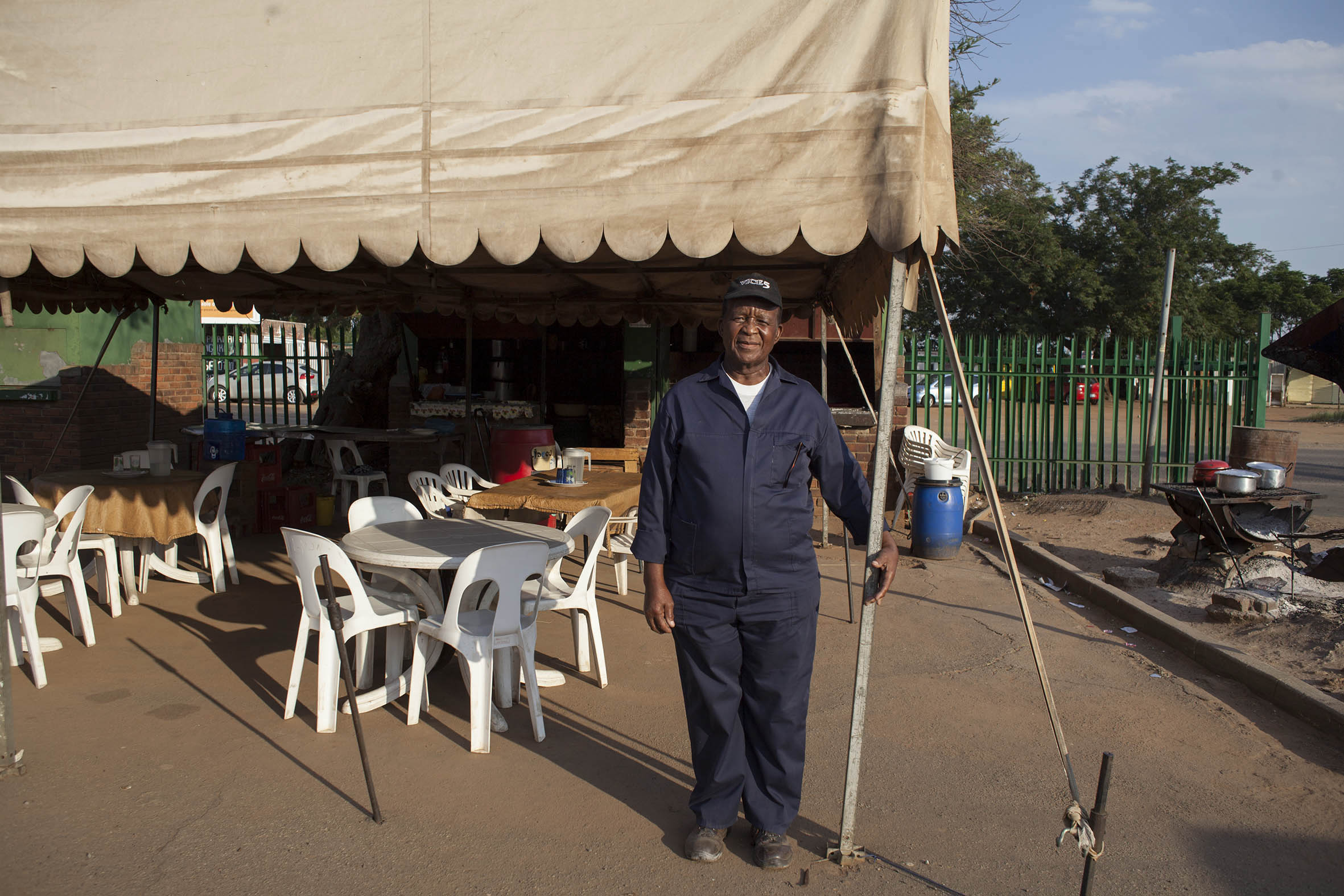
[Jafta Mogorosi said that Bop was the ‘top dog’ among all the homelands (Oupa Nkosi)]
Now retired, Mogorosi runs a fast-food outlet in the Mogwase shopping centre, a run-down, forgotten complex with a dilapidated roof and potholed parking lot.
“In 1994, he [Mangope] told us we should go and join the new dispensation. But he warned that we will remember him and his work soon. Look now,” says Mogorosi, pointing at the shabby centre.
He remembers Mangope as a strict, stern, feared and highly dignified leader who “just wanted the truth, nothing else”.
Agnes Mosito runs a sewing business in a warehouse at the Mogwase industrial site, which was built by the Bophuthatswana administration in the early 1980s.
She grew up in Mabele-a-podi village near Mogwase and remembers life in Bophuthatswana as blissful.
“We never knew suffering. We saw stadiums being built. We saw factories being built, roads,” she sighs. “Today we are sitting in these factories [but there is] no maintenance.”
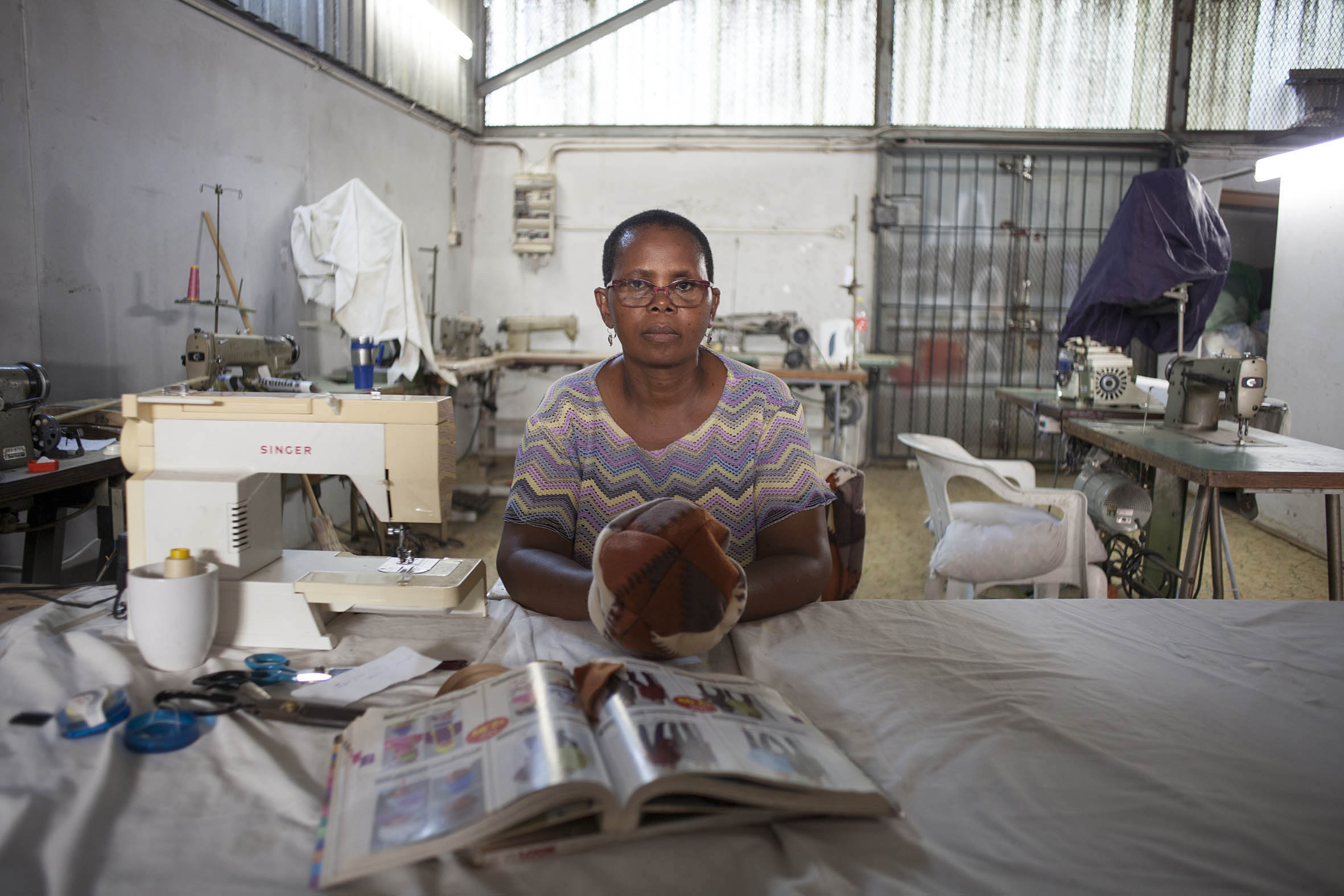
[Agnes Mosito says of Mangope: ‘We never saw suffering’ (Oupa Nkosi)]
She blames the sorry state of the factories on the alleged failure of the North West Development Corporation to undertake regular maintenance and give support to emerging businesses.
“Under Bophuthatswana, these factories were well looked after. He [Mangope] left us schools, but now some of them have been closed down and they are in ruins,” says Mosito.
She also believes that socially and morally, Mogwase has degenerated under the current administration.
Like many of those who grew up under the iron hand of Mangope’s rule, Mosito cites the mushrooming of taverns and alcohol abuse, and the authorities’ failure to clamp down on public drinking and general lawlessness, on the decline in governance standards since the Bop administration’s demise.
On Wednesday, a police lieutenant, Sam Dube, who had joined the Bophuthatswana police in Motswedi in 1989, told mourners at the statesman’s memorial service that Mangope had ensured that his police enforced the law, including the Liquor Act, to the letter.
He said the burgeoning of taverns was now creating problems in communities — a far cry from when they were closely regulated under Mangope’s rule.
Although he looks back on Mangope’s reign as an oppressive and heavy-handed one, Nnane believes there were some positives that are missing under today’s rulers.
“Under Mangope, there was law and order. Roads were being taken care of. Service provision was so very high. But today, things are becoming worse, worse, worse,” says Nnane.
He cites the neglected Tlhabane Stadium, not far from his home, as an example of the rot besetting the current administration. During the Bop reign the field was the home of Tlhabane Swallows, a local team affiliated to the Bophuthatswana Soccer League. But now it’s a neglected shell where the only sport being played is the smoking of drugs and the illicit sex being had by horny couples.
“There was oppression under Mangope. That is why I will never cry for him. But life was o’right. Even though there was no money, things were a little bit cheap. Under the present government, money speaks louder than words. If you have money, you don’t go to jail, even if you break the law,” he says.
In the village of Braklaagte near Zeerust, residents like Olebogeng Merafe have not forgotten the brutality unleashed by Mangope’s soldiers in 1989.
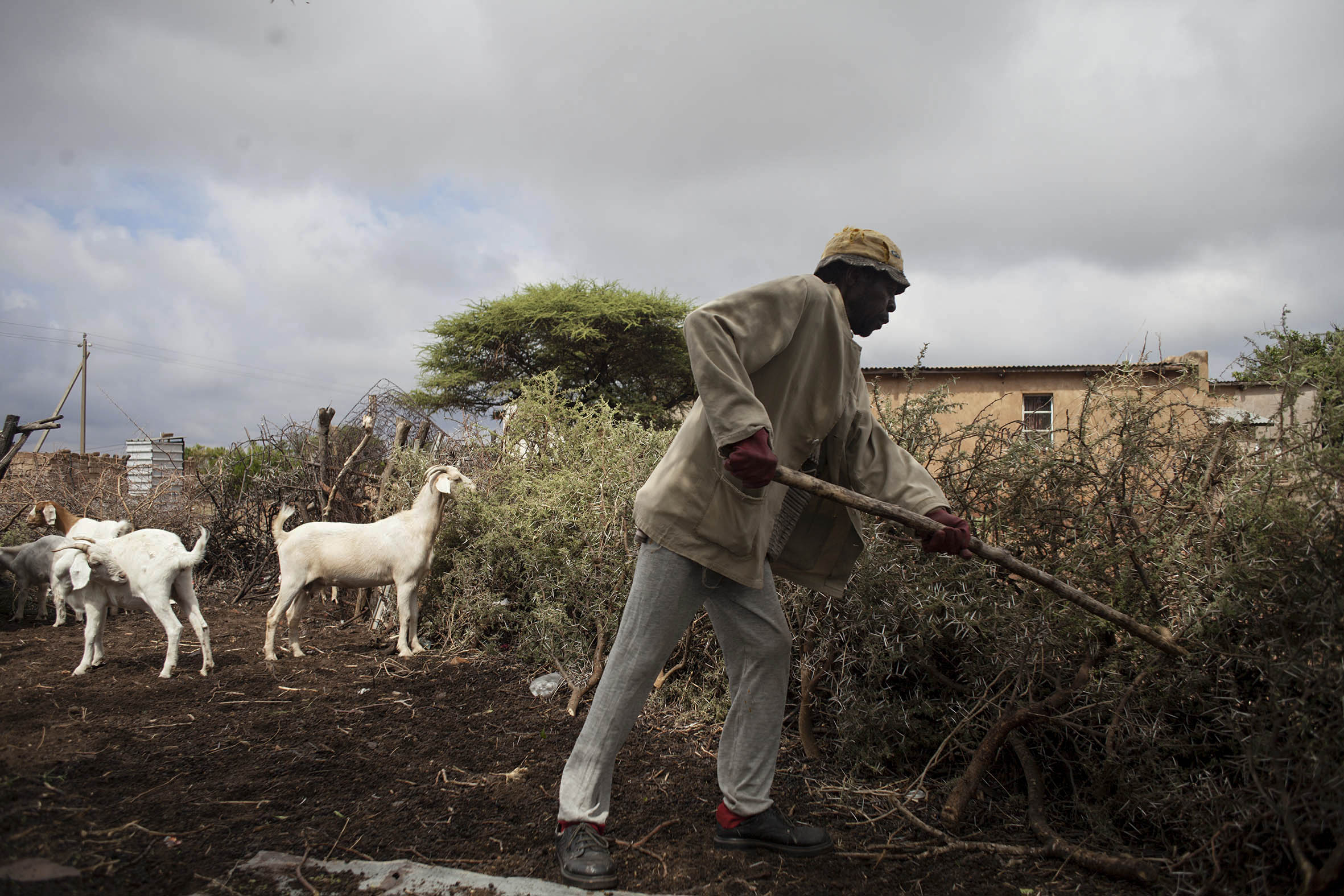
[Olebogeng Merafe refused to canonise Lucas Mangope, remembering him as a brutal ruler (Oupa Nkosi)]
In December 1988, the apartheid South African government legalised the incorporation of the Braklaagte and Mokgola communities, whose ancestors had bought land at the turn of the century, into Bophuthatswana. The move was met with fierce resistance by residents, who shunned the homeland administration. Mangope reacted with force, sending his soldiers and police to terrorise the residents into submission.
“I will always remember him as someone who humiliated us, brutalised us and forced us to flee our homes and live in the bush,” says Merafe.
“I was beaten up and fled from home. I lived in the bush for a month. People used to bring us bread over there. There was no schooling. Our cattle were just roaming around the bush. People didn’t want to be ruled by Mangope. They preferred to be ruled by the Boers,” he says, tending to his goats just hours before the memorial service in honour of Mangope was to get underway in Motswedi some 30km away.
“I felt sad when I heard of his passing. But I will never forget what Mangope’s soldiers did to us. They never wanted to see people in the streets. They would beat us up with sjamboks or they would smash your head with an R4 [rifle] and kick you here in the kidneys,” says Merafe, gesturing.
Despite the hostile relations between Mangope and the ANC through the years, it appeared that old enmities were suddenly forgotten when news of his death was made public.
The North West provincial government sent a representative to the memorial service after earlier applying to national government to grant him an official provincial funeral.
Schoolchildren from Motswedi High sang hymns and recited a Setswana poem in praise of Mangope, thanking him for raising them with love and teaching them respect.
This is despite the fact that Mangope presided over a regime that brutalised and killed opponents of apartheid, and that he was convicted on 90 charges of fraud and for stealing R2.8‑million from the proceeds of mining royalties meant for his clan, the Bahurutshe-Bo-Manyane.
The doctrine of not speaking ill of the dead was observed to the letter. As was witnessed during the memorial service, among the elderly folk of Motswedi and other areas where his reign was appreciated, he remains a hero. Yet making a judgment call on Mangope’s legacy will remain a difficult matter that is complicated by the pages of history.
At best, he could be defined as a man who tried to build a normal, functioning, progressive society during abnormal times. He tried to do so under the protection, guidance and direction of a racist, oppressive, brutal system that had been declared a crime against humanity by the free world.
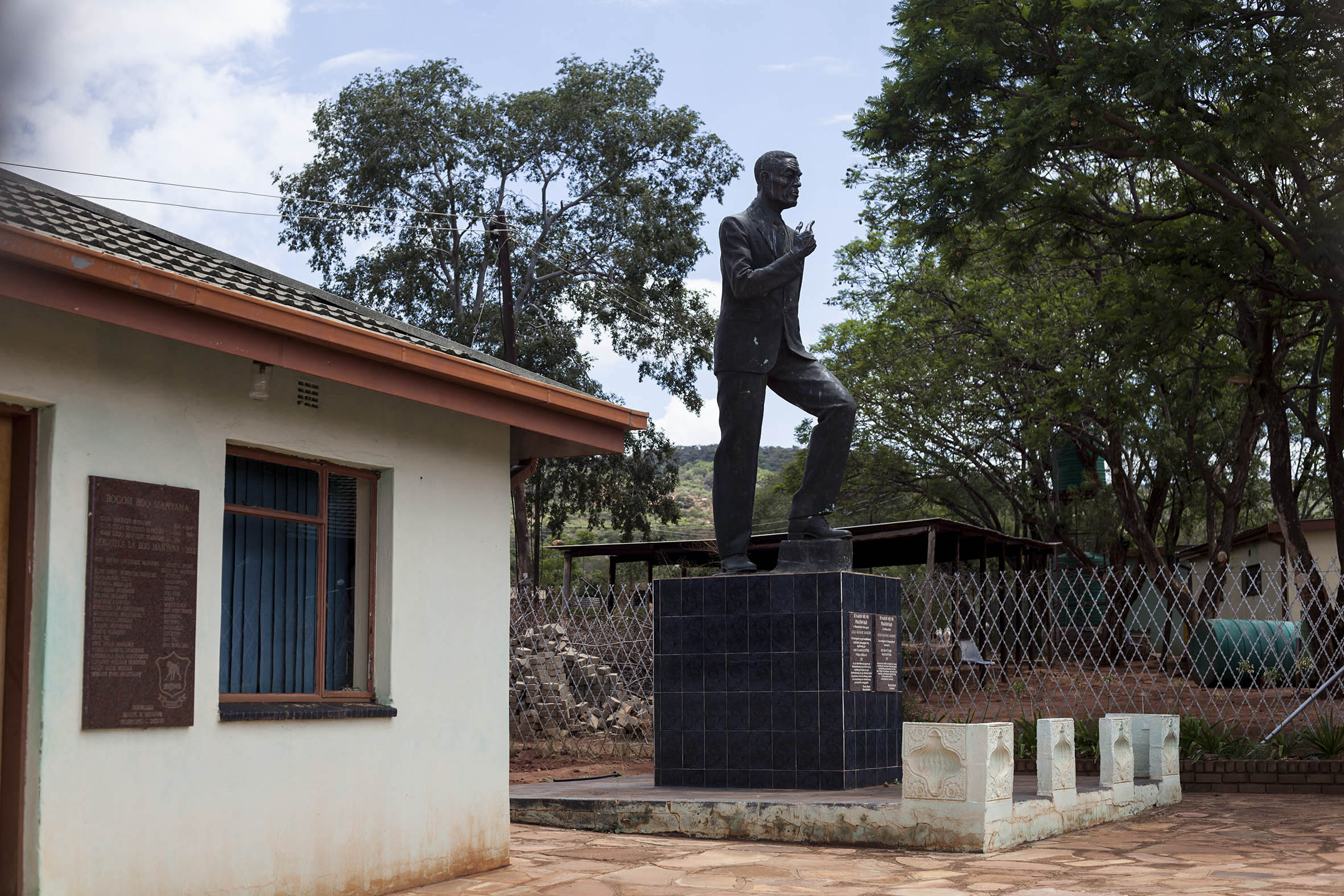
[A statue of Mangope stands in the village of Motswedi (Oupa Nkosi)]
Can such a man, regardless of how many schools, colleges, factories, roads and casinos he built, be hailed as a hero?
Could it be argued, perhaps, that he was simply an overly ambitious, ruthless, naive, narrow-minded tribalist power monger who saw collaboration with a band of oppressive, racist — and equally ambitious and naive — looters as an easy way to sate his lust for power, no matter the price? — Mukurukuru Media